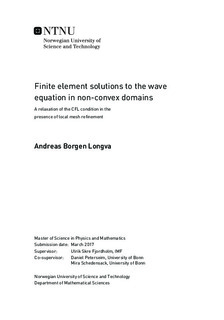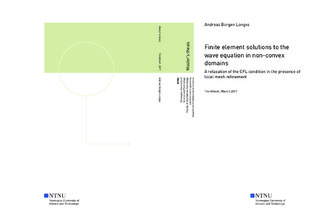| dc.description.abstract | Finite element solutions in non-convex domains generally suffer from reduced convergence rates due to reduced regularity. This is also the case for the wave equation. To remedy the situation, (strong) local mesh refinement can restore the optimal convergence rates associated with smooth solutions in convex domains. However, this is problematic for the application of explicit time integrators such as the Leapfrog method, for which time steps are required to satisfy the well-known CFL condition.
In this thesis, we study a method proposed by Peterseim and Schedensack which promises to recover the stability of the Leapfrog method while maintaining the optimal convergence rate associated with convex domains. The method has two stages. In the offline phase, a basis for a \emph{corrected} finite element space is constructed. In the online phase, the wave equation is solved as usual with the mass- and stiffness matrices from the corrected space.
The main contribution of this thesis is the efficient implementation and subsequent evaluation of the practical applicability of the method by Peterseim and Schedensack. We show through numerical experiments that the cost of computing the basis is reasonable in the sense that it can be within the same order of magnitude as the cost of online computations. Moreover, we show that the method clearly outperforms the solution methods considered with respect to the cost of online computations.
In addition, we propose an augmented version of the Leapfrog method which is shown to perform very well in numerical experiments, and we prove that the method is stable under the same CFL condition as the standard finite element space on the quasi-uniform mesh.
The thesis concludes with a discussion of settings for which the method may be particularly well-suited and lists scenarios for which the method is expected to perform poorly. | |

